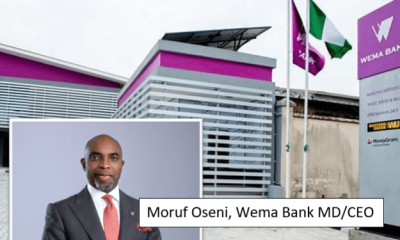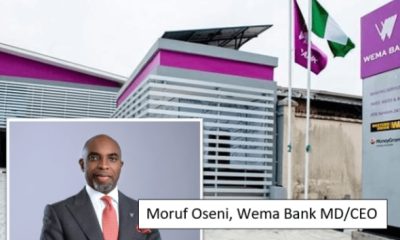Business
The Rise of Impact Investing: Wema Bank Green & Gender Financing Drive in Focus

The Rise of Impact Investing: Wema Bank Green & Gender Financing Drive in Focus
The deployment of funds into investments that generate a measurable and beneficial social or environmental impact, along with a financial return on investment (UNDP).
The term ‘Impact Investing’ has gained increasing recognition in recent years across regional and global spheres and sectors.
Following growing awareness of the limitations of corporate social responsibility (CSR) activities in addressing societal and economic concerns, thought leaders and drivers of sustainability across sectors, industries and nationalities have shifted the focus to creating better avenues for measurable, positive socio-economic impact.
Impact investing relates to the more measurable initiatives, policies and procedures set in place to provide long-term solutions to the socio-economic inequalities that affect modern societies and economies. This is further exemplified by the imposition of new criteria for measuring the effectiveness of social and sustainability initiatives across all areas of materiality towards the overarching need for the achievement of the Sustainable Development Goals by 2030.
Renewable energy and gender financing are two major focus areas of the impact investing movement with the global Net-Zero Emissions commitments signed on by over 140 countries to achieve carbon neutrality and the Gender 2x Challenge commissioned by the G7 summit in 2018 as a bold commitment to encourage financial and development finance institutions and the broader private sector in women across the world. These two areas have specific goals of preserving climate energy levels below 1.50C and bridging the gender equality gap respectively.
Wema Bank, a leading organization in the Nigerian sustainability space, is not behind the times with respect to the impact investment agenda with a focus on innovative financing and catalytic funding.
As far back as 2018, the Bank expanded its socio-economic focus beyond the limited scope of Corporate Social Responsibility (CSR) and adopted the Corporate Social Investment (CSI) policy as the strategy for achieving the sustainability vision of providing solutions for societal impact.
All social impact initiatives championed by the Bank cut across five core Corporate Social Investment pillars namely; Economic Empowerment, Education, Environment, Finance & Health. Over 500,000 beneficiaries across the nation have been impacted so far.
In keeping with the rise of impact investing especially along the global Green Energy and Gender Financing focus areas, Wema Bank has the following initiatives targeted at both areas of materiality:
Green Finance Facility – There is a general understanding by the leadership of the Bank that financing choices tie directly to the necessary transition to a greener and more sustainable economy. In pursuit of the drive to build climate resilience through the financing of adaptation measures, the Bank launched a Green Energy Finance Facility to enable SMEs and individuals reduce their emissions through power generation. The facility provides opportunities for SMEs to access up to N10million for renewable energy solutions in their business operations and processes.
Sustainable Finance – Wema Bank is committed to the systemic reduction of financed emissions through reduced lending to high climate risk sectors and promoting investment in more sustainable segments of the economy such as renewable energy, waste management, gender finance, smart agriculture amongst others. About N50billion has been invested in sustainable businesses so far with enhanced incentives for the adoption of sustainable business practices promoted through outlets such as the Vendors Environmental & Social Forum, SME Business School, webinars and bankwide sustainability training courses amongst others.
SARA by Wema: The Bank’s proposition for women was established to provide gender-targeted solutions across the workplace, community and marketplace segments. In response to the AfDB report of a $42billion gender financing gap and the World Economic Forum estimate of 136 years to bridge the gender equality gap, SARA by Wema has led diverse empowerment initiatives to promote gender finance. In alignment with the Gender 2x Challenge commitment to promoting women-owned/women-led businesses, Wema Bank has provided over N58.9billion uncollaterized loans to women MSMEs across the nation through the SARA proposition. This is a direct solution provided by the Bank to the access to finance problem and lack of collateral for accessing loans highlighted as some of the major obstacles encountered by women businesses.
Over 45,000 women have also benefitted from the diverse access to market programs such as online and physical trade fairs. SARA by Wema also champions training programs and seminars as well as skill acquisition workshops to promote business growth and entrepreneurial success for women businesses.
This is further bolstered by the provision of business startup kits and grants for over 30,000 women in the Nigerian SME sector.
UN-WEP Commitment: In November 2021, Wema Bank committed to the United Nations Women Empowerment Principles targeted at offering guidance on how to empower women in the workplace, marketplace and community. Since adoption of the 7 principles, diverse initiatives and policies have been implemented to promote the work towards the achievement of Sustainable Development Goal 5 – Gender Equality. A clear example of the foregoing is reflected in the update to the Bank’s procurement strategy to provide priority to female-owned businesses on the Bank’s supply chain in alignment with UN-WEP principle 5 – Enterprise Development, Supply Chain & Marketing Practices. The Bank has also introduced vendor categorization and tracking for seamless onboarding processes to ensure even more female representation on the supply chain.
Gender financing and the need for sustainable business practices are also emphasized for all the Bank’s vendors and suppliers at the annual Vendors Environmental and Social Forum.
In further alignment with the United Nations Women Empowerment Principles – Principle 1 – Establish High-level Corporate Leadership for Gender Equality, the Bank appointed its first female Chairperson – Dr. Oluwayemisi Olorunshola – in June 2023.
This is yet another bold step in the Bank’s path to the achievement of gender equality and equity. Women empowerment in the workplace is also promoted through the Wema Women Network – the internal structure for female employees across all cadres and levels within the Bank.
The Wema Women Network charter objective of empowering Wema women to become achievers in their career and personal lives is continually driven through growth and development initiatives such as quarterly connect sessions and workshops, mentorship opportunities through the internal Big Sister Program, career development and etiquette trainings, fitness programs amongst others.
Youth Empowerment: Youths form the majority of the Nigerian population with 70% under the age of 30. They also constitute the primary drivers of digital innovation and other socio-economic and environmental solutions targeted at specific societal issues. This is further evidenced by the impressive volume of fintechs, ed-techs, health-techs and other solutions making a significant impact across the nation and African continent.
Wema Bank is deliberate about promoting youth innovation and empowerment and has consistently led the drive starting with the launch of ALAT – Africa’s first digital banking platform with over 2.1 million active customers transacting daily. Not an institution to rest on its oars, Wema Bank also launched the ALAT x FGN partnership in 2023. In partnership with the Federal Government of Nigeria, Wema Bank launched the Digital Skillnovation Program for MSMEs through which digital hubs will be established in 15 states across the country as innovation centers equipped with advanced technology for optimal impact.
The Bank’s youth empowerment drive also continues with a partnership with the Small and Medium Enterprise Development Agency (SMEDAN) for capacity-building exercises on solar installation and sustainable entrepreneurship for Nigerian MSMEs. These Solar Powered Hubs include locations across all regions in the country to promote solar power transition and adoption as part of efforts towards achieving the national 2060 net-zero emissions target.
The above and many more provide proof of Wema Bank’s immense contribution and participation in the global drive for promoting impact investing. Impact investing is the way to go in ensuring sustainable finance and providing a positive impact across the environmental, social, economic and governance pillars of sustainability.
As the world draws closer to the 2030 Agenda timeline, it is important, now more than ever, for all players to get on board in shedding the traditional financing measures causing more harm than good and promote the triple bottom line – People, Planet and Prosperity through impact investing and sustainable finance.
Impact investing provides a business unusual approach to solving socioeconomic and ecological problems and ensures the positive impact is driven to the last mile. In this aspect, Wema Bank’s commitment to empowering lives through innovation and providing solutions for societal impact continues to ring true.
Towards the establishment of a better world, Wema Bank is a stellar example of a business that seeks to do well by doing good through the creation of useful solutions to meet the dynamic needs of the populace with Initiatives centred on social equity and diversity, empowerment, hybrid working models and sustainable business practices.
Business
Federal Mortgage Bank of Nigeria disburses N440 billion, delivers 39,000 homes since 1993 – Shehu Osidi

Federal Mortgage Bank of Nigeria disburses N440 billion, delivers 39,000 homes since 1993 – Shehu Osidi
The Federal Mortgage Bank of Nigeria (FMBN) has revealed it has disbursed N440 billion and delivered approximately 39,000 new homes under the National Housing Fund (NHF) scheme since its re-establishment in 1993.
This achievement was highlighted by the bank’s Managing Director and Chief Executive, Mr. Shehu Osidi, during his presentation at the 18th Africa International Housing Show in Abuja.
His presentation, titled “Financing the Housing We Need: A New Dawn at FMBN as an Institutional Enabler,” detailed the bank’s accomplishments in housing finance.
Osidi noted that, in addition to the N440 billion disbursed and the 39,000 new homes delivered, FMBN has provided around 25,500 mortgages and extended over 120,000 micro-housing loans, all offered under a single-digit interest rate lending regime.
“Since its re-establishment in 1993, the Bank has delivered about 39,000 new homes, about 25,500 mortgages and over 120,000 micro housing loans, all within a single-digit interest rate lending regime.
“Under the National Housing Fund (NHF) Scheme, it has registered 26,350 organisations and over 5.8 million cumulative contributors with over 1 million accounting for the self-employed sector.
“The Bank has disbursed the cumulative of N440 billion under its various loan windows to drive affordable housing finance for the Nigerian economy,” Osidi said.
Additionally, the FMBN Managing Director disclosed that in compliance with the provisions of the National Housing Fund Act, the bank has refunded N84.8 billion to 492,604 contributors who exited the scheme.
More insights
Highlighting more achievements of the Federal Mortgage Bank of Nigeria (FMBN), Osidi noted the recovery of N12 billion from the Federal Ministry of Finance.
This recovery was part of the N19 billion in wrongful deductions of National Housing Fund (NHF) contributions, which had been previously misconstrued as revenue under the 40% deduction regime. He further mentioned that FMBN continues to engage with relevant authorities to halt these deductions and recover the remaining balance of the trapped NHF funds.
Additionally, he explained that FMBN has expanded its loan products from mortgage financing to include housing construction, micro-housing financing, and rent-to-own options. New additions such as Home Improvement and Rent Assistance loans specifically target the non-salaried informal sector.
Osidi highlighted that the bank’s clientele now includes primary mortgage banks, real estate developers, housing cooperatives, and individual NHF contributors. Despite modest numbers, he emphasized that FMBN remains a key player in the housing sector.
He also outlined the executive management’s seven-point agenda, which focuses on enhancing automation, promoting cost efficiency, improving credit quality, effective project management, and expanding strategic partnerships to transform FMBN into a responsive and reliable institution.
Business
Analysis: Fidelity Pension Managers 2023 audited company and fund accounts

Analysis: Fidelity Pension Managers 2023 audited company and fund accounts
Fidelity Pension Managers recently published its 2023 audited accounts, providing a summary overview of its financial health and fund performance.
This report provides a summary review and presents key financial highlights, financial ratios, fund performance, and the trend in the number of Retirement Savings Account (RSA) holders.
Financial Highlights
Total Revenue: Total revenue for the company rose 23% to ₦2.59 billion in 2023, up from ₦2.1 billion in 2022. From the reports, this increase is attributed majorly to higher fee income generated from the pension funds it has under management.
Profit After Tax (PAT): PAT rose 26% to ₦666 million, up on the previous year’s 21% rise.
Operating Expenses: Operating expenses rose slower than revenue and PAT by 22% to ₦1.76 billion from ₦1.44 billion, leading to a slight drop in the company’s cost-to-income ratio, which fell to 67.98% from 68.57%. The company seems to be relatively prudently managing financial resources, amidst rising costs and inflationary pressures.
Shareholder’s Funds: The company’s shareholders funds ended the year at ₦5.95 billion in 2023 up 5% from the ₦5.64 billion in 2022.
Return on Equity (ROE): ROE was a very low 11.21%. Whilst this is a slight improvement on 2022’s 9.41%, the company does not seem to be efficiently deploying shareholders’ equity to generate profits.
Financial and Fund Highlights

Corporate Audited Annual Results

Financial Ratios

Fund Performance Highlights
RSA Funds Performance: Fidelity Pensions offers six of the seven regulated RSA pension funds to the public. Notably, all six funds put in a better performance than the previous year, whilst only four funds out-performed the industry benchmark returns (see our article on benchmark returns here).

5-Year Audited Pension Funds Performance

Number of RSA Holders
RSA Growth: The growth in the number of RSA holders was another highlight of the year. Fidelity Pension Managers saw an increase of 2.48% in RSA holders, adding 8,005 new accounts to close the year at 331,124 RSA holders.


Demographic Analysis
Age Distribution: The majority of 330,000 RSA holders (83.9%) registered in 2023 fell within the age bracket of <30 years to 39 years, indicating a young and growing industry subscriber base. Of the 2023 registrations, Fidelity Pension Managers recorded 2.43% of this growth.

Conclusion
Fidelity Pension Managers has demonstrated improved financial growth in 2023, marked by increased revenue, higher profitability, and a growing RSA customer base. However, the company remains constrained by low assets under management, which limits its fee-generating potential. To overcome this challenge, Fidelity Pension Managers must focus on enhancing the performance of the funds it manages and attracting more RSA holders. Improved fund performance will not only benefit current RSA holders but also make Fidelity Pensions an attractive option for those looking to transfer their pensions.
Business
Zenith Bank maintains its position as Nigeria’s top bank in terms of Tier-1 capital for the 15th consecutive year.

Zenith Bank maintains its position as Nigeria’s top bank in terms of Tier-1 capital for the 15th consecutive year.
Zenith Bank Plc for fifteenth consecutive year has retained its position as the Number One Bank in Nigeria by Tier-1 Capital in the 2024 Top 1000 World Banks’ Rankings, published by The Banker Magazine.
This ranking places Zenith Bank Plc as the 565th Bank globally with a Tier-1 Capital of $2.01 billion. The rankings, published in the July 2024 edition of The Banker Magazine of the Financial Times Group, United Kingdom, recognise Zenith Bank’s continued financial strength and stability.
They are based on the 2023 year-end Tier-1 capital of banks globally and remain the primary source for global bank financials used by most international organisations in their assessments of banks.
Tier-1 Capital describes capital adequacy, the core measure of a bank’s financial strength from a regulator’s perspective. According to the ranking, Tier-1 Capital, as defined by the latest Bank for International Settlements (BIS) guidelines, includes loss-absorbing capital, i.e., common stock, disclosed reserves, retained earnings, and minority interests in the equity of subsidiaries that are less than wholly owned. A strong Tier-1 capital ratio boosts investor and depositor confidence, indicating the Bank is well-capitalised and financially stable.
Commenting on this achievement, the Group Managing Director/CEO of Zenith Bank Plc, Dame (Dr.) Adaora Umeoji, OON, said, “We are deeply honoured to be recognised as the Number One Bank in Nigeria by Tier-1 Capital for the fifteenth consecutive year.
“This recognition is a testament to our strategic focus on sustainable growth, innovation, and customer satisfaction. It also emphasises our resilience and strength in navigating the ever-evolving financial landscape.
“Our dedicated team of professionals has remained steadfast in ensuring that we maintain our position at the forefront of the banking industry.” She extended her profound and sincere appreciation to the Founder and Chairman, Dr. Jim Ovia, CFR, whose visionary and transformative leadership has played a pivotal role in cultivating a resilient and thriving establishment.
“She also expressed her deep appreciation for the board’s insightful governance, the staff’s relentless dedication, and the unwavering loyalty of the bank’s esteemed customers to the Zenith brand.
Zenith Bank’s financial performance for the year was driven by a remarkable triple-digit growth of 125% in gross earnings, from N945.6 billion reported in 2022 to N2.132 trillion in 2023.
This growth led to an improved market share in both the retail and corporate segments despite a persistently challenging macroeconomic environment. The increase in gross earnings was primarily due to growth in interest and non-interest income. Interest income growth was attributed to the increase in the size of risk assets and their effective repricing, while non-interest income was driven by significant trading gains and gains from the revaluation of foreign currencies.
Zenith Bank recently commenced recapitalisation efforts with the conclusion of its Capital Markets Day held on 11th July 2024. It aims to raise the least amount of capital amongst its peers at N230 billion, considering it already maintains a robust capital base of N270.7 billion.
The Bank remains dedicated to supporting the growth of the Nigerian economy and providing its numerous customers with innovative and efficient banking solutions.
Zenith Bank’s track record of excellent performance has continued to earn the brand numerous awards, with these latest accolades coming on the heels of several recognitions. These include being recognised as the Number One Bank in Nigeria by Tier-1 Capital for the fourteenth consecutive year in the 2023 Top 1000 World Banks Ranking, published by The Banker Magazine.
The Bank was also awarded the Bank of the Year (Nigeria) in The Banker’s Bank of the Year Awards for 2020 and 2022; and Most Sustainable Bank, Nigeria in the International Banker 2024 Banking Awards.
Further recognitions include Best Bank in Nigeria for three consecutive years from 2020 to 2022 in the Global Finance World’s Best Banks Awards and Best Commercial Bank, Nigeria for three consecutive years from 2021 to 2023 in the World Finance Banking Awards.
Additionally, Zenith Bank has been acknowledged as the Best Corporate Governance Bank, Nigeria, in the World Finance Corporate Governance Awards for 2022 and 2023, and ‘Best in Corporate Governance’ Financial Services’ Africa for four consecutive years from 2020 to 2023 by the Ethical Boardroom.
The Bank’s commitment to excellence saw it being named the Most Valuable Banking Brand in Nigeria in the Banker Magazine Top 500 Banking Brands for 2020 and 2021, and Retail Bank of the Year for three consecutive years from 2020 to 2022 at the BusinessDay Banks and Other Financial Institutions (BAFI) Awards.
The Bank also received the accolades of Most Sustainable Bank, Nigeria, in the International Banker 2023 Banking Awards, Best Commercial Bank, Nigeria and Best Innovation in Retail Banking, Nigeria, in the International Banker 2022 Banking Awards.
Zenith Bank was named Bank of the Decade (People’s Choice) at the ThisDay Awards 2020, Bank of the Year 2021 by Champion Newspaper, Bank of the Year 2022 by New Telegraph Newspaper, and Most Responsible Organisation in Africa 2021 by SERAS Awards.
-

 News2 years ago
News2 years agoWhat Led Us To Choose Peter Obi As Our Candidate?-Middlebelt Forum
-

 BREAKING NEWS10 months ago
BREAKING NEWS10 months agoKey Insights for the Upcoming 2023/2024 UEFA Champions League Campaign
-

 Entertainment9 months ago
Entertainment9 months agoTaylor Swift Skips Travis Kelce’s Big Game to Prepare for ‘Eras Tour’
-

 News6 months ago
News6 months agoPaul Agbonze Obazele Addresses Labor Party Leaders in Edo Central Senatorial District
-

 BREAKING NEWS11 months ago
BREAKING NEWS11 months agoVan Gaal Alleges 2022 World Cup Rigged in Favor of Messi and Argentina
-

 News1 year ago
News1 year ago“New King of Serie A,” Tinubu hails Osimhen on winning the Serie A Title
-

 BREAKING NEWS12 months ago
BREAKING NEWS12 months agoBayern Munich Engages in Discussions for the Acquisition of David De Gea from Manchester United
-

 News2 years ago
News2 years agoHappy 62nd Anniversary of Nigeria’s Independence!

















